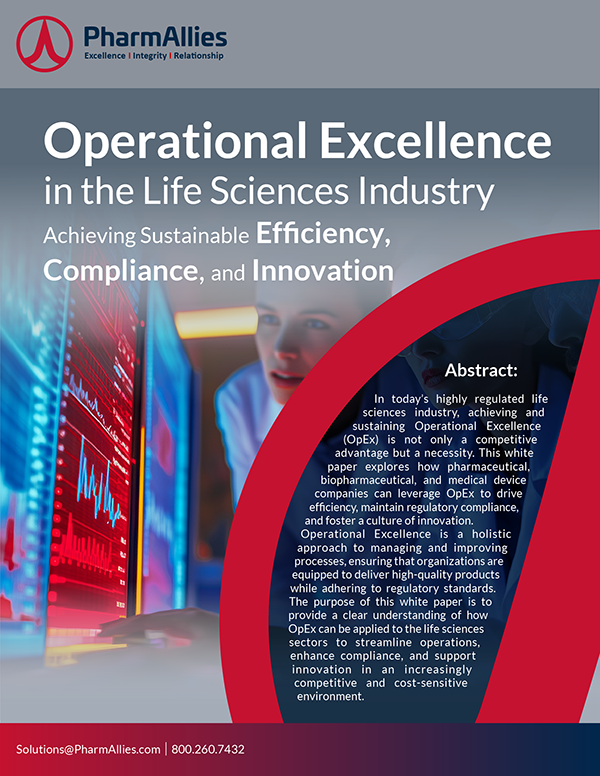Why Operational Excellence (OpEx) is Essential in the Life Sciences Industry
Introduction
In today’s fast-paced life sciences industry, Operational Excellence (OpEx) is not just an advantage; it’s an essential requirement for achieving sustainable success. For professionals in pharmaceuticals, biopharmaceuticals, and medical devices, the challenge is clear; we need to produce high-quality products quickly, efficiently, and consistently, all while adhering to rigorous regulatory standards. This article explores the significance of OpEx in life sciences, how it addresses unique industry challenges, and the concrete, real-world benefits it can bring to your work and career growth.
Understanding Operational Excellence in Life Sciences
Operational Excellence (OpEx) is a comprehensive management approach that prioritizes the highest levels of efficiency, quality, and performance across an organization. Unlike isolated improvements, OpEx aims to establish a culture of continuous improvement and optimization in every facet of operations. In the life sciences sector, OpEx involves deploying methodologies such as Lean, Six Sigma, Quality Risk Management (QRM), and digital transformation to streamline processes, reduce inefficiencies, and minimize errors, thereby ensuring consistent, high-quality results.
OpEx is particularly crucial in life sciences because our work directly impacts patient health and safety. The stakes are high, with precise, reliable processes necessary to ensure regulatory compliance, product quality, and, ultimately, positive patient outcomes. Adopting OpEx allows organizations to achieve a balance of quality, speed, and cost-effectiveness, critical for long-term success in this competitive field.
Why Operational Excellence (OpEx) Matters in Life Sciences
1. Navigating Regulatory Compliance
Life sciences is one of the most regulated industries, and for good reason, our work directly impacts human health. Regulatory bodies such as the FDA, EMA, and ISO set rigorous guidelines that govern every stage of product development, manufacturing, and distribution. OpEx supports compliance by embedding quality and control into every process. With OpEx methodologies like Quality Risk Management (QRM), we can adopt a proactive, risk-based approach to compliance. This approach not only helps us meet regulatory standards more efficiently but also ensures that we prioritize high-risk areas, minimizing the chance of deviations, recalls, and costly rework.
2. Meeting Market Demands and Reducing Time-to-Market
The life sciences industry is under intense pressure to deliver innovative treatments and products faster than ever. With rising competition and the demand for personalized therapies, time-to-market is crucial. OpEx helps us optimize processes to reduce lead times, enabling us to bring products to market quickly without compromising quality. Techniques such as Value Stream Mapping (VSM) and Kaizen help us identify and eliminate non-value-added activities, minimizing bottlenecks and streamlining production. By focusing on continuous improvement, we can accelerate our development timelines, ensuring we remain competitive and responsive to patient needs.
3. Ensuring Consistent Product Quality
Consistency is a hallmark of quality in life sciences, and for good reason, any variation in product quality can have serious implications for patient safety and efficacy. OpEx methodologies like Six Sigma enable us to reduce process variability and maintain high standards across production batches. By employing statistical process control, root cause analysis, and Quality by Design (QbD) principles, we can identify and mitigate sources of variability, ensuring that each product meets rigorous quality standards. This level of consistency is especially important for biologics, where even minor deviations can significantly impact therapeutic efficacy.
4. Driving Cost Efficiency
Rising costs are a significant challenge in life sciences, where research and development, manufacturing, and regulatory compliance require substantial resources. OpEx addresses this by enabling us to do more with less. Lean manufacturing principles, such as 5S, Kanban, and Just-in-Time (JIT), help us eliminate waste, streamline operations, and improve resource allocation. By optimizing our processes and reducing operational waste, we can achieve greater cost efficiency, freeing up resources to reinvest in innovation, expansion, or other strategic initiatives.
5. Leveraging Digital Transformation for OpEx
The life sciences industry is experiencing a digital revolution with the integration of advanced technologies like artificial intelligence (AI), Internet of Things (IoT), and cloud-based platforms. Digital tools enhance OpEx by providing real-time data, enabling predictive maintenance, and supporting process automation. For example, digital twins allow us to create virtual models of physical processes, helping us test and optimize production before making changes in the real world. These technologies are crucial for maintaining compliance in a digital-first environment, where data integrity, traceability, and cybersecurity are top priorities.
What are the Benefits of Operational Excellence (OpEx) for Life Sciences Professionals
Implementing OpEx in our work offers immediate and long-term benefits that are both measurable and impactful. Here are some of the ways we, as life sciences professionals, can experience the benefits of Operational Excellence (OpEx).
-
Enhanced Efficiency and Productivity: By optimizing workflows, we can reduce redundancies, improve resource utilization, and increase throughput, allowing us to achieve more with less.
-
Greater Job Satisfaction: OpEx empowers us to identify inefficiencies and implement improvements, fostering a sense of ownership and pride in our work. This collaborative approach encourages problem-solving, creativity, and innovation.
-
Reduced Compliance Risks: With a risk-based approach to quality management, we can proactively address compliance issues, reducing the likelihood of costly recalls, audits, or regulatory sanctions.
-
Professional Development Opportunities: OpEx often involves training in methodologies like Lean, Six Sigma, and QbD, giving us valuable skills that enhance our expertise and make us more effective in our roles.
-
Stronger Market Competitiveness: By improving speed-to-market, quality, and cost efficiency, OpEx helps us contribute to our organizations’ competitive edge in an industry that demands both innovation and compliance.
How to get Started with Operational Excellence (OpEx) in Life Sciences
If you’re ready to integrate OpEx into your work, consider starting with these steps.
-
Identify High-Impact Areas: Look for processes in your work that are time-consuming, prone to errors, or challenging to control. These areas are ripe for OpEx initiatives.
-
Learn the Basics of Lean and Six Sigma: Familiarize yourself with Lean and Six Sigma principles, and consider taking a Green Belt certification course. These methodologies will equip you with the tools to reduce waste, minimize variability, and improve process efficiency.
-
Embrace Continuous Improvement: Operational Excellence is an ongoing journey. Set small, achievable goals for process improvements, and encourage your colleagues to participate. Remember, even incremental changes add up to significant improvements over time.
-
Leverage Data and Digital Tools: Use data to monitor your progress and measure success. If your organization uses digital tools like IoT or predictive analytics, explore ways to incorporate these into your OpEx initiatives to gain real-time insights and improve decision-making.
-
Collaborate with Cross-Functional Teams: Operational Excellence thrives in a collaborative environment. Work with colleagues from quality, manufacturing, regulatory, and IT to identify process improvements that benefit the entire organization.
Conclusion
Operational Excellence is more than just a set of methodologies; it’s a commitment to continuous improvement, innovation, and resilience. In the life sciences industry, Operational Excellence (OpEx) is particularly impactful because it enables us to balance quality, speed, and compliance in a way that positively impacts patients and drives industry advancement. The journey toward OpEx may be challenging, but the benefits are significant, both for our careers and for the industry at large. By embracing Operational Excellence, we can create a professional environment that values innovation, accountability, and collaboration. And in doing so, we’re better equipped to meet regulatory demands, respond to market needs, and ultimately, make a positive difference in the lives of patients around the world.
Now is the time to consider how OpEx can enhance your role, your career, and your impact. The life sciences industry is evolving rapidly, and those who commit to Operational Excellence will be best positioned to lead the way in this dynamic field.
Want to learn more about Operational Excellence (OpEx) in the Life Sciences industry?
Follow us on LinkedIn and Download PharmAllies’ White Paper on Operational Excellence (OpEx) in the Life Sciences Industry.
Download the White Paper HERE

Discover how Operational Excellence drives efficiency, compliance, and innovation in life sciences with PharmAllies’ latest white paper.


